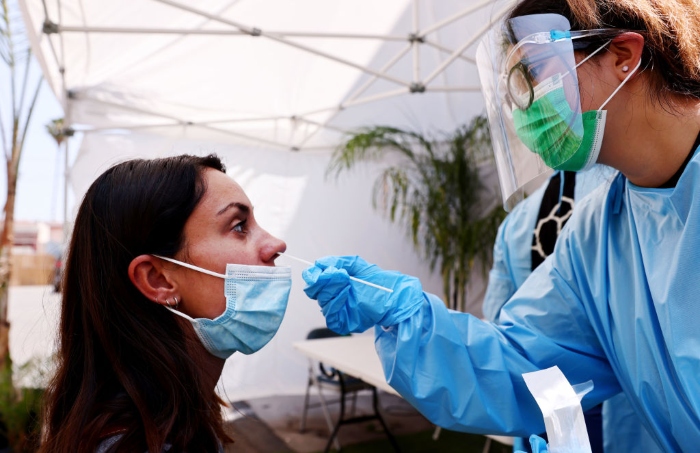Live on the homepage now!
Reader Supported News
 n the middle of March, I texted my friend Tahir Luddin, an Afghan journalist who lives in the Washington area, after I saw a video he had posted on Facebook of his teen-age son running on a treadmill. My text was banal, a quick check-in to see how he and his loved ones were faring amid the isolation of the past year. “How is your family? How are you?” I wrote. “See the pictures of your children on FB. Your son is very tall!!!” Tahir did not reply. At the time, I didn’t worry and assumed that he would get back to me. Our communications were sporadic, but our bond was unusual.
n the middle of March, I texted my friend Tahir Luddin, an Afghan journalist who lives in the Washington area, after I saw a video he had posted on Facebook of his teen-age son running on a treadmill. My text was banal, a quick check-in to see how he and his loved ones were faring amid the isolation of the past year. “How is your family? How are you?” I wrote. “See the pictures of your children on FB. Your son is very tall!!!” Tahir did not reply. At the time, I didn’t worry and assumed that he would get back to me. Our communications were sporadic, but our bond was unusual.
Twelve years ago, Tahir, an Afghan driver named Asad Mangal, and I were kidnapped by the Taliban after one of their commanders invited me to an interview outside Kabul. Our captors moved us from house to house and eventually brought us into the remote tribal areas of Pakistan, where the Taliban enjoyed a safe haven. Our guards told Tahir how eager they were to execute him and the many ways that they would mutilate his body. They treated me far better and demanded that the Times, my employer at the time, pay millions of dollars in ransom and secure the release of prisoners from Guantánamo. We were held all together, in the same room, and Tahir and I spent hours talking, regretting the anguish that we were causing our families.
After more than seven months in captivity, Tahir and I escaped. As our guards slept, Tahir guided us to a nearby military base. (Asad fled on his own, several weeks later.) It was an end to our ordeal that neither of us had dared to believe was possible. I reunited with my wife—we had got married just two months before I was kidnapped—in the United States. Fearing reprisals from the Taliban, Tahir and, later, Asad moved here as well. In the years since, Tahir and I both transformed our lives. I forswore war reporting and became the proud father of two daughters. Tahir’s path was more arduous. Settling in northern Virginia, he worked as an Uber driver, then started delivering packages for Amazon. He lived with other immigrant men in a succession of cramped apartments, sending most of his earnings home to his large family, who remained in Kabul. In 2017, after becoming a U.S. citizen, Tahir brought his five oldest children to the U.S. to live with him.
In April, I tried calling Tahir but couldn’t reach him. Concerned, I sent him a series of text messages. Again, no reply. Alarmed, I sent him an e-mail, and he responded right away. “I am in kabul since March the 28th,” he wrote, in the fragmented English that I’d come to know well during our months in captivity. “The taliban are just outside kabul. Thousands of afghans are leaving kabul everyday.” He said he had applied for visas that would enable the rest of his family in Afghanistan to join him in the U.S. I was relieved to hear this. Days earlier, President Biden had announced that all U.S. troops would pull out of Afghanistan by September 11th. For years, Tahir had hoped for a peace deal in Afghanistan. Now he was focussed on safely getting his loved ones out of the country. I assumed that Tahir, as an American citizen, would be able to secure visas for his wife and remaining children, the youngest of whom is four.
Around the same time, another Afghan friend of mine, Waheed Wafa, who spent a decade as a reporter for the Times in Kabul, had come to the same conclusion as Tahir about the prospects for his country. Waheed had made repeated visits to the United States but always returned to Afghanistan, determined to stay in his homeland. In 2019, a gunman had fired on a car that was supposed to be taking Waheed to the airport, wounding the driver. Waheed was not in the vehicle at the time and is not sure whether he was the one being targeted. He helped to rescue the driver and take him to the hospital. In 2020, the Taliban carried out a wave of targeted assassinations that killed more than a hundred Afghan civilian leaders, including doctors, journalists, and human-rights advocates. In a new tactic, the Taliban had begun placing magnetic bombs under the cars of their victims—to terrorize the city. “They are going to the soft targets,” Waheed told me in a phone call.
In May and June, I contacted refugee-aid groups, nonprofit legal organizations, and academic entities to see whether they could help Tahir and Waheed. The replies I received were warm but noncommittal. Becca Heller, the head of the International Refugee Assistance Project, told me that she was shocked at the Biden Administration’s lack of advanced planning. Senior White House and State Department officials did not appear to grasp the number of Afghan civilians who, like Tahir and Waheed, had backed the U.S. effort and would be in grave danger if the Taliban regained power. The U.S. had attempted one of the largest efforts to rebuild a nation since the Second World War, funding the creation of schools, health clinics, and independent media outlets across the country. According to the International Rescue Committee, over the past twenty years three hundred thousand Afghan civilians have been affiliated with the American project in the country.
Tahir spent two months in Kabul waiting for his wife and children to receive visa interviews at the U.S. Embassy, and then, in mid-June, returned to the United States. He was frustrated and out of money. In the wake of Biden’s announcement about the American withdrawal, thousands of Afghans had applied for visas, and Tahir’s applications for his wife and children were somewhere in the queue. A COVID outbreak in the U.S. Embassy further slowed the process.
In mid-July, as the pullout of U.S. troops approached, Tahir and Waheed told me that they had both given up on the idea of American visas. They told me that they would welcome visas to Turkey or another third country, where they would be beyond the Taliban’s reach. I reached out to current and former government officials whom I had met during past reporting. They told me that priority was being given to processing the applications of twenty thousand Afghans who had worked as translators and other employees of the U.S. military. Current and former military officials assailed the pace of that effort by the Administration as well. Three months after Biden’s withdrawal announcement, only about seven hundred of the twenty thousand military translators had arrived in the United States. Advocates had pressed for the U.S. to undertake an effort akin to the Ford Administration’s evacuation of tens of thousands of South Vietnamese—by air and by boat to Guam—before the fall of Saigon, in 1975. Biden Administration officials listened politely but seemed to lack urgency. When I asked Administration personnel about the Guam option and Tahir’s case, I got caring replies but the same message: there was nothing that could be done for Tahir’s family in Kabul.
On August 3rd, I decided to go public. During the Aspen Security Forum, which was held virtually this year, I asked Zalmay Khalilzad, the senior U.S. diplomat overseeing peace negotiations with the Taliban, about Tahir’s case. “He is desperately trying to get his wife and children out of Kabul,” I said. “What do I say to this journalist? He saved my life. He’s a U.S. citizen. He has a right to bring his wife and children here.” Khalilzad said that he, as an immigrant himself, understood Tahir’s situation. “With regard to your journalist friend, I would urge him to get in touch,” he said. “We will put him in touch with the right person at the embassy.” The answer raised my hopes. I obtained an e-mail address from the State Department for Khalilzad’s office. Days later, a staffer was in touch with Tahir but had little new information. At this point, his six-year-old’s petition for travel to the U.S. had been cleared, but the petitions for his other young children were still being processed, more than four months after they had been submitted.
Over the next several days, I visited Tahir in his apartment in northern Virginia. For hours, Tahir and I sat alone in a room, trying to come up with a plan. It was the most time we had spent together since we had been kidnapped. One evening, news broke that the Taliban had assassinated the government’s top media officer in Kabul. Tahir knew the official, a former journalist. When he showed me a video of the man singing to a group of his friends, he wept, just as we both had, at times, in captivity. The highlight of the trip was meeting his five older children, who ranged in age from sixteen to twenty-one. We ate Afghan food and homemade pizzas. His eldest teen-age son worked at McDonald’s. His younger son loved riding his bike around Washington. His two oldest daughters dreamed of attending Northern Virginia Community College and becoming physician’s assistants. His children all spoke a few words of Spanish, a language they were learning from their classmates in high school. His daughters talked of the discrimination they faced because they wear head scarves. Tahir and I had spent hours discussing religion in captivity. He told me that Islam and Afghan tradition required him to save my life. He was, and remains, deeply religious. We talked about the ways, both good and bad, that living in America was changing his children. I told Tahir that they were becoming Afghan Americans. He said that he was proud of them.
Late one night, Tahir called his family in Kabul. He told his wife that I was visiting. She thanked me for my help. She assumed that I could save their lives, just as Tahir had saved mine. The uncomfortable truth was that, despite three months of effort, I had made no progress. The U.S. government said that it was helping, but the American effort was focussed, much as it had been throughout the war, on saving American lives, not Afghan ones. The same discounted value of Afghan lives compared to American ones had been in effect during our confinement. Tahir and Asad would have been executed before me, because my life was considered more valuable than theirs. Now, a dozen years later, American diplomats were being rescued—but the Biden Administration, intentionally or not, had created the conditions for a humanitarian catastrophe for Afghans.
On Thursday, August 12th, with the Taliban beginning to seize provincial capitals, Waheed texted me that he had managed to obtain Turkish visas for himself and his family, with the help of a friend, another foreign journalist. Waheed told me that he had purchased tickets for a flight from Kabul to Istanbul on August 20th. But it would be too late. Two days later, the Taliban had surrounded Kabul. I texted Waheed and asked him whether I could send him money or help him in any way. “Thank you, David, I am heartbroken for what is happening here but so proud to have friends like all of you,” he wrote. “I am grateful to all of your kind messages and support.” On Sunday morning, the Taliban entered the city, and I texted Waheed again. He responded optimistically. “Kabul panicked this morning and the city was in chaos,” he said. “Now it is getting better.”
I reached Tahir, who was frantically calling his family in Kabul. He said that the Taliban were patrolling the streets outside their home. He decided that it was best for them to stay inside. Waheed and his family, along with thousands of other Afghans, went to the Kabul airport in hopes of flying out of the country. Waheed told me that U.S. troops were allowing American citizens into a small military-run section of the airport that was secure. Afghans were left to fend for themselves. Instead of the five thousand troops that the Biden Administration claimed were being dispatched to Afghanistan to facilitate the evacuation of U.S. personnel and a limited number of Afghans who had aided the American effort, Waheed estimated that he saw five hundred American troops trying to secure the area, without barbed wire or any other equipment. At one point, shooting erupted. After waiting for twenty hours, Waheed and his family left the airport. There was a Taliban checkpoint outside. Taliban members searched the family’s bags and found his son’s PlayStation. One of the Taliban men, thinking the device was a computer, demanded that Waheed give them “the passport,” probably meaning “the password.” Waheed tried to explain that it was only a children’s game. “They said it’s a computer. It’s a game. Can you believe it?” They finally let the family pass.
Waheed told me that he was going into hiding for two days. When I spoke with him again, on Tuesday, he said that Afghans were primarily responsible for the debacle. “Most part of it was our own mistake, our own incapability, that’s why we see this situation. Now, no one can take the blame out of them. The civil society, the government, everybody.” But he also questioned the lack of planning around the U.S. withdrawal. “They saw these provinces were falling day by day and there was no action to at least protect Kabul for some time,” he said. “What happened to your intelligence, your defense ministries?” Waheed also confided his fears to me. “We saw the city full of these strange armed men. With strange clothing and hair styles. We are back in the nineties, you can’t believe these people are back.” The last time the Taliban had seized power, in 1996, their reign had begun with relative calm, but they quickly started conducting house raids, making arrests, and inflicting other abuses.
On Monday night, Tahir called me after midnight. He spoke in a whisper because his children were asleep. He had heard that the Taliban were searching homes in Kabul and looking for anyone who had worked with Americans. “I think the Americans are trying to leave Kabul and just take the diplomats,” he said. Just as he had in captivity, he shared with me his anxieties. “I’m strong, you know I am strong,” he said, but he was having trouble sleeping. “I cried so many times. Everyone says we’re left behind. What shall we do?”













